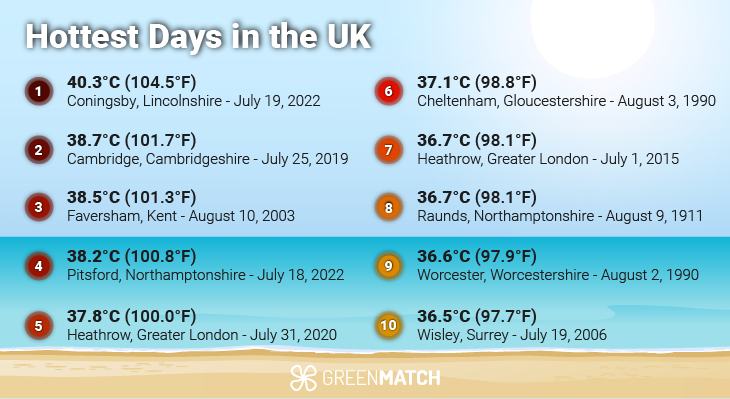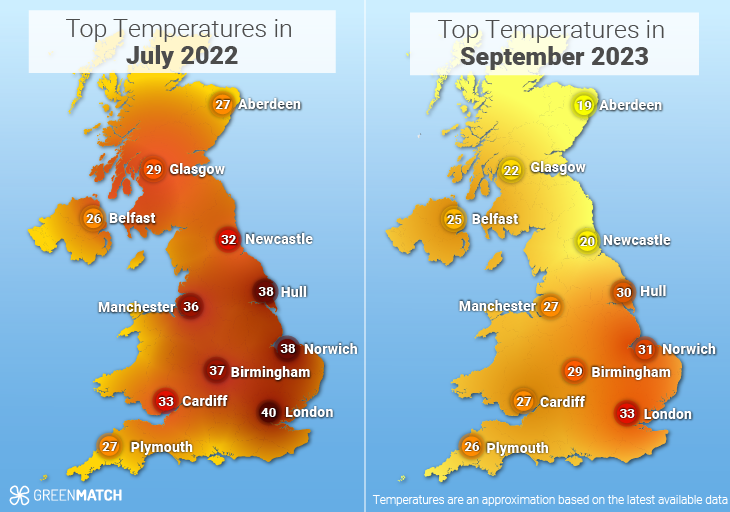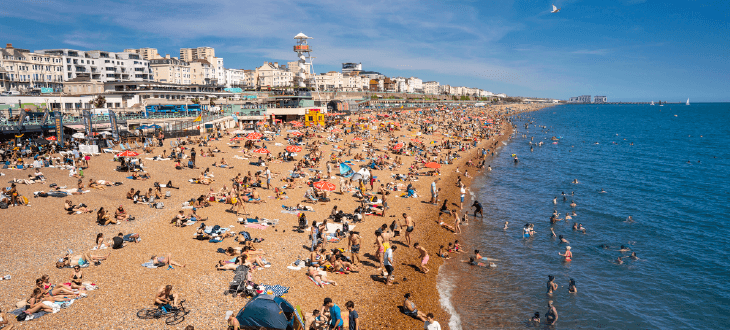- GreenMatch
- Blog
- When is the Next UK Heatwave?
When is the Next UK Heatwave?


Well known for our cold, wet weather, the UK isn’t somewhere you normally think of when you hear ‘heatwave’. However, this has changed in recent years, as record-breaking temperatures are becoming increasingly common across the country.
In July 2022, the UK recorded it’s hottest day ever, as temperatures passed 40°C for the first time in known history. In fact, the UK has experienced it’s top ten hottest years since 2002, with June 2023 recorded as the hottest on record.
While many of us enjoy a break from the dull weather, this intense change to our climate isn’t all good news. Such high temperatures can be life-threatening, and with predictions that heatwaves may become even more frequent, it’s time we took a closer look at this phenomenon.
In this article, we’ll explore why Britain is experiencing such high temperatures and what’s changed since the early 2000's? And can we do anything to prevent or prepare for even more heatwaves?
Are UK heatwaves on the rise?
It’s no secret that we Brit’s love a bit of sunshine - it’s usually rare! But since the early 2000’s we’ve experienced more scorching days, and more commonly, we’re hearing the term ‘heatwave’ each summer.
The Met Office (the UK’s weather experts) define a heatwave as a period of at least 3 consecutive days which meet or exceed a given threshold based on location - for example, 25°C. They can last from a few days to a few weeks and are considered an extreme weather event.
As seen below, in the top 10 hottest recorded days, our temperatures have been rapidly rising throughout the summer months, year on year.

Although 2022 still holds the record for the hottest day ever in the UK, 2023 has also proven to be a much warmer year than expected.
In September 2023, a heatwave was declared from the 4th to the 10th, as temperatures exceeded 30°C for seven consecutive days. During this heatwave, the year's hottest day was recorded on September 9th, reaching 33.2°C at Kew Gardens, London.
What is particularly surprising about this event is that it occurred much later in the year than experts would have expected, rather than the summer months of July or August.
This wasn’t the only stand-out moment of the year, however. June was recorded as the hottest month since the 1880s, with a highest temperature of 32.6°C.
With all these temperature records being broken, it’s clear that things are changing quickly and dramatically.
The Met Office predicts 2024 could be the hottest year on record, with temperatures potentially breaching the 1.5°C threshold. Imagine London's bustling streets as hot as some of the world's most renowned tropical destinations. We're talking temperatures that could rival those in Portugal, with London expected to see the mercury soar to 30-33C (86-91F).
So, why is this happening? To put it simply, climate change is the cause. Driven by human activity that produces greenhouse gases.
These gases (such as carbon dioxide, methane and nitrous oxide), are created every time we burn fossil fuels (like gas or oil) to drive our cars or power our homes. Deforestation, farming, waste landfills and pollution are also major contributors.
As greenhouse gases continue to enter Earth’s atmosphere, they trap the sun’s heat, warming the planet. As time passes, we see the impact of this excess heat as it starts changing our climates.
For the UK, climate change is experienced in both extremes of hotter, drier summers and much wetter winters. Storms and floods are more frequent due to rising sea levels driven by warmer oceans. Our winters are milder, so we see more rain and less snow.
It’s predicted that by 2070, our winters could be up to 3.8°C warmer and up to 39% wetter than in 1990. On the surface, this doesn’t sound so bad. Still, things begin to get more serious when you consider the knock-on effect these weather changes have on our natural environment, animals and plants and ultimately our food supply.
Should we be concerned about heat waves?
The Met Office predicts that heat waves in the UK are now 30 times more likely due to climate change. While some people hear the term ‘heat wave’ and think about hitting the beach or dusting off the BBQ, there’s a much more serious side to this that we need to consider.
In 2022, the top temperature recorded in the UK was 40.3°C. According to a recent study conducted at the University of Roehampton London, once outside temperatures go beyond 40°C, the human body can start to lose its ability to cool down. This can significantly impact how a person's body functions and can cause additional stress on those with heart issues, for example.
In the same year, 2022, England recorded the highest number of heat-related deaths ever. More than 4,500 people died due to high temperatures. Heatwaves can directly cause this by increasing the risk of dehydration, heatstroke and heart failure. The elderly and those with health conditions are the most vulnerable.
The risk to life increases in the UK when temperatures rise above 22°C. Considering all of the hottest temperatures in recent years are reaching far above this, it’s clear that we need to be taking heatwaves seriously.
Heatwaves are known as "silent killers," particularly affecting vulnerable groups such as the elderly, those with pre-existing health conditions, and isolated individuals. The risk of heat-related illnesses like dehydration, heat exhaustion, and heatstroke is expected to increase.
To better prepare for future heat waves, the UK Health Security Agency has created a ‘heatwave plan’ to reduce the risk of severe heat for yourself and others. You can also read our guides to help you keep your home cool and find out when to open windows in hot weather.
Can we prevent heatwaves in the UK?

As we’ve seen, heat waves are directly caused by human activities that increase the global temperature. If we want to change their frequency or intensity, we need to reduce our global impact.
Although this change won’t happen overnight and requires a dedicated global effort, we can make a difference individually. By adopting a more eco-friendly approach to our daily activities, we can live more sustainably and reduce our environmental impact.
Here are just some things you could do to make a difference:
-
Reduce. Reuse. Recycle:
Reduce household waste by reusing, repurposing, or recycling items. Choose secondhand items over brand-new ones, and donate your unwanted items.
-
Switch to renewable energy sources:
You could install solar panels to produce electricity or replace a fossil-fuelled gas boiler with a low-carbon air source heat pump.
-
Think about transport:
Opt for public transport or cycling, or consider an electric vehicle to reduce emissions.
Are you ready to beat the heat and embrace a sustainable future? Don't wait for the next heat wave to catch you off guard. Take action now and enjoy a cooler, greener home tomorrow.
When is the next heatwave in the UK?

We all know that weather forecasts are not always accurate. The day you choose not to take your brolly is inevitably the day it rains! But the experts are usually good at predicting the likelihood of big weather events like heat waves.
According to the Met Office, weather forecasts for heatwaves can be predicted up to a week in advance. However, due to the nature of our constantly shifting atmosphere, forecasts are most accurate the smaller the time frame (i.e. a day or two before), so it’s not possible to know months or years ahead of time.
However, the experts have predicted future weather conditions based on current and historical data. One such prediction states:
By 2070, the chance of exceeding 30°C for two days or more throughout the year increases. Projections show that exceeding 30°C for two days or more over southern parts of the UK becomes sixteen times more frequent than it is today.
It’s hard to know when exactly our next heatwave might arrive, but with our recent temperature record, it’s safe to bet that future UK weather forecasts won’t be cooling down soon.
What’s the future for UK weather?
While the entire UK is set to feel the heat, some areas will be turning up the thermostat more than others. Southeast England is expected to be the hotspot, with temperatures potentially outdoing those in some holiday destinations.
The UK’s weather pattern is changing rapidly, and it’s clear to see how climate change affects our temperatures. As our planet warms, we see more frequent and severe heat waves and, human activities are primarily responsible for this change.
As temperatures rise, the risk to life increases, and it’s crucial that we make efforts now to reduce our environmental impact. By choosing renewable alternatives and avoiding actions that release greenhouse gases, we can help to minimise the threat of increasing global temperatures.
We all enjoy warm summers and a chance to escape the wet weather, but with future predictions showing heatwaves becoming hotter and more frequent, now is the time to make changes. Understanding these issues, taking steps to reduce our impact, and preparing for weather extremes will help us all thrive better.
As we gear up for a sizzling summer, there are plenty of ways to stay cool and make the most of the heat wave. From indulging in delicious ice creams to exploring the UK's beautiful beaches and parks, there's no shortage of fun to be had. And let's not forget the importance of staying hydrated, slapping on that SPF, and finding those perfect shady spots for a picnic.

Becky is an experienced SEO content writer specialising in sustainability and renewable trends. Her background in broadcast journalism inspires reliable content to help readers live more sustainably every day.
We strive to connect our customers with the right product and supplier. Would you like to be part of GreenMatch?





